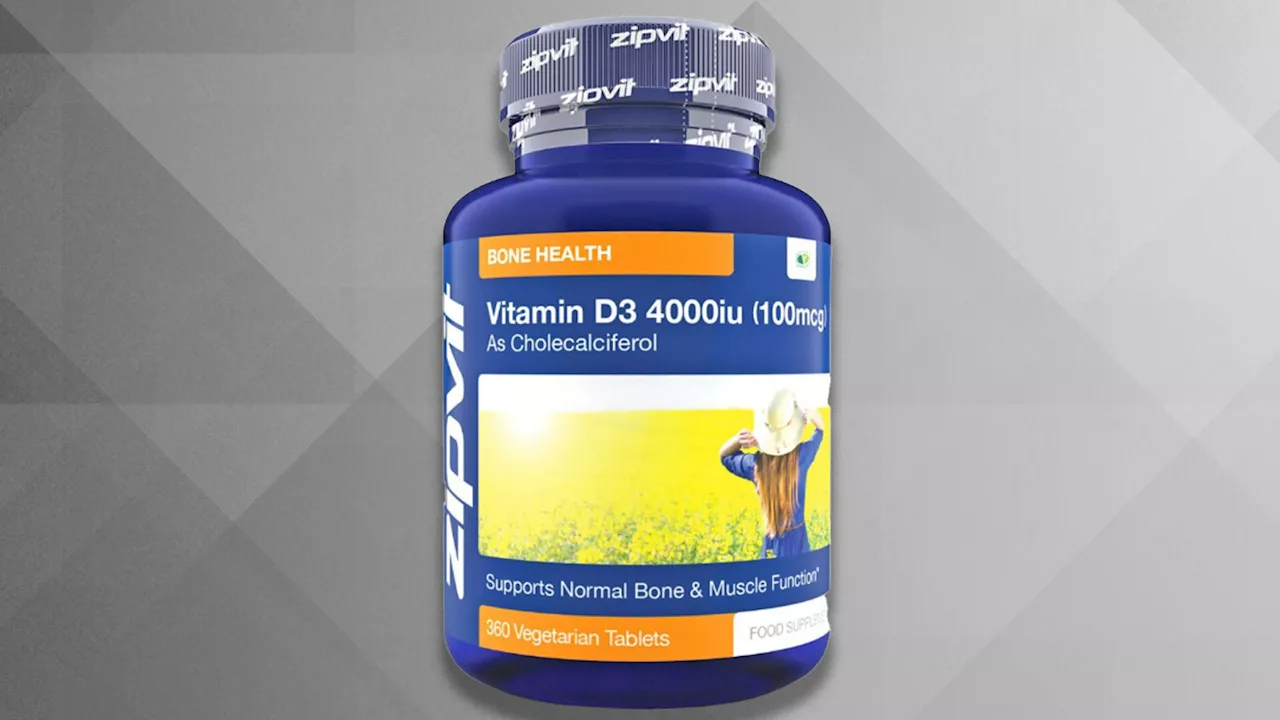Feeling run down this winter? You may be experiencing a vitamin deficiency. This article explores common vitamin deficiencies, their symptoms, causes, and how to boost your intake.
Feeling run down or like you're flying at half mast? It's easy to dismiss many vitamin deficiency symptoms as simply feeling a little groggy, especially in the winter, when our moods and energy levels tend to naturally dip – and cold and flu season can take the wind out of our sails. But, these are all common signs of a mineral or vitamin deficiency.
One of the best things we can do for our wellbeing, especially in the winter months when our immune systems have more to deal with, is to ensure we're topping up our vitamin levels through our diet (as a first port of call), or the best vitamin D supplements. Now more than ever, “our bodies rely on vitamins and minerals (like vitamin D, iron, B12, zinc, and B9) to reenergise us and reduce the risk of catching germs and viruses,” notes Jana Abelovska, superintendent pharmacist at Click Pharmacy. “Vitamins and minerals are essential for our health, with low levels of these nutrients leading to symptoms that can sometimes be very dangerous,' she continues. “In the colder months, symptoms like low mood, fatigue or a weakened immune system could all be signs of a nutritional deficiency. If you are finding winter hard this year and not feeling well, it might help to get your vitamin and mineral levels checked,” recommends Jana. But, she warns, “before you start taking a new supplement, it’s always best to consult with a medical professional, as supplements can interact with medications, and might be harmful if taken in excessive amounts.” Why might you have a vitamin deficiency? There are many reasons why you might not be able to keep up the vitamin and mineral levels you need through diet alone. “While a healthy diet that contains a wide variety of nutritious foods will generally give you the vitamins and minerals you need, some people are at a greater risk than others for developing a deficiency,' explains Jana. For example… Your environment It's important to take note of your environment and when certain vitamins are likely to drop to their lowest levels. “This winter, everyone should consider taking a vitamin D supplement, as with less sunlight, it’s easier to develop a deficiency in this immune-system boosting vitamin,” Jana insists. Your menstrual cycle If you have a particularly heavy flow, you might notice you feel extra unwell around the time of your period. That's because 'menstruation is linked to iron deficiency,' notes Jana. Your diet If you remove certain food groups from your diet, you may find your body misses our on some of the vitamins or minerals it needs. “People who follow a vegan or plant-based diet are more likely to be deficient in the important B vitamin, B12,” explains Jana. Your age As we age, the amount of minerals and vitamins are body absorbs tends to drop. “Older people are more likely to develop a vitamin or mineral deficiency,” says Jana. Ahead, the most common vitamin deficiency symptoms to know… Vitamin D Signs you're deficient Weak immune system, low mood, low energy and muscle weakness. Vitamin D at A glance Vitamin D is a fat-soluble vitamin that helps our teeth and bones grow stronger and is essenital for general maintenance. “It's is often called the ‘sunshine vitamin’ because our bodies produce it in response to sunlight,” explains Jessica Sepel, founder of JSHealth Vitamins & Expert Nutritionist. Since there's not a ton of sunlight in the UK, it's a pretty common deficiency here. “The government has reported that nearly 1 in 6 people have low levels of vitamin D, and advises that everyone should take supplements in the autumn and winter,' explains Jana. 'When we are exposed to sunlight, our bodies make this essential vitamin – but during the winter it’s harder for people in the UK to maintain a healthy level of vitamin D, with shorter, darker days,” she continues. “Vitamin D has been linked to tiredness and low mood, which could be mistaken for winter blues. Deficiency in this vitamin has also been linked to a weakened immune system, meaning that people with low levels of vitamin D might be at greater risk of catching a cold, flu and other winter bugs,” Jana adds. How to boost your intake “As well as using supplements, you can boost your vitamin D levels through your diet. Oily fish, eggs and meat are all good sources, as are fortified breakfast cereals and spreads. However, dietary sources alone may not give you enough of this vitamin,” says Jana. Try: Supplements, fortified cereals, oily fish, eggs, red meat and liver. Iron Signs you're deficient Fatigue, poor concentration, low mood and weak immune system. Iron at a glance Iron is a key mineral to keep your body running. It impacts physical and mental performance and “is needed to produce haemoglobin, the protein in our red blood cells that carries oxygen to our tissues, and myoglobin – the protein in our muscles that stores oxygen,” confirms Rhian Stephenson, nutritional therapist and founder of Artah
VITAMINDEFICIENCY WINTERHEALTH NUTRITION WELLBEING SUPPLEMENTS
United Kingdom Latest News, United Kingdom Headlines
Similar News:You can also read news stories similar to this one that we have collected from other news sources.
 Tingling Feet Could Signal Vitamin B12 DeficiencyExperts warn that tingling sensations in the feet might be a symptom of a vitamin B12 deficiency. Vitamin B12 is crucial for wound healing, red blood cell production, and various bodily functions. A shortage can impair wound recovery and lead to neurological complications. Increasing intake through foods like eggs, beef, and cheese, or supplements, is recommended.
Tingling Feet Could Signal Vitamin B12 DeficiencyExperts warn that tingling sensations in the feet might be a symptom of a vitamin B12 deficiency. Vitamin B12 is crucial for wound healing, red blood cell production, and various bodily functions. A shortage can impair wound recovery and lead to neurological complications. Increasing intake through foods like eggs, beef, and cheese, or supplements, is recommended.
Read more »
 Tingling Feet: A Warning Sign of Vitamin B12 DeficiencyA surprising symptom in your feet could be a sign of a vitamin B12 deficiency. Learn how to increase your intake of this crucial nutrient through diet and supplementation.
Tingling Feet: A Warning Sign of Vitamin B12 DeficiencyA surprising symptom in your feet could be a sign of a vitamin B12 deficiency. Learn how to increase your intake of this crucial nutrient through diet and supplementation.
Read more »
 Combatting the Winter Blues with Vitamin DThis article discusses the author's experience with using vitamin D supplements to combat the winter blues. It highlights the benefits of vitamin D for mood, energy levels, sleep, and immune system function. The article also mentions Blue Monday, a day often associated with feelings of depression, and suggests vitamin D as a potential solution.
Combatting the Winter Blues with Vitamin DThis article discusses the author's experience with using vitamin D supplements to combat the winter blues. It highlights the benefits of vitamin D for mood, energy levels, sleep, and immune system function. The article also mentions Blue Monday, a day often associated with feelings of depression, and suggests vitamin D as a potential solution.
Read more »
 Pharmacist Warns of Common Shingles Risk This WinterA Superdrug pharmacist is urging people to be aware of the risk of shingles, especially those who have had chickenpox and are over 50. She highlights the importance of early treatment to prevent complications like nerve pain.
Pharmacist Warns of Common Shingles Risk This WinterA Superdrug pharmacist is urging people to be aware of the risk of shingles, especially those who have had chickenpox and are over 50. She highlights the importance of early treatment to prevent complications like nerve pain.
Read more »
 Flu Hospitalizations Quadruple This Winter: Doctor Offers Easy Ways to Differentiate from the Common ColdFlu cases have surged this winter, with hospitalizations quadrupling in the past month. A doctor offers simple tips to distinguish flu symptoms from a common cold, highlighting the importance of recognizing the severity of influenza.
Flu Hospitalizations Quadruple This Winter: Doctor Offers Easy Ways to Differentiate from the Common ColdFlu cases have surged this winter, with hospitalizations quadrupling in the past month. A doctor offers simple tips to distinguish flu symptoms from a common cold, highlighting the importance of recognizing the severity of influenza.
Read more »
 Car Seat Safety: Avoid These Common Winter MistakesParents are warned about potential dangers of overdressing children for car seats in cold weather. Bulky clothing can obstruct car seat straps, increasing the risk of injury in an accident. Additional tips include avoiding thick hats, limiting car seat time for babies, and ensuring proper ventilation to prevent overheating.
Car Seat Safety: Avoid These Common Winter MistakesParents are warned about potential dangers of overdressing children for car seats in cold weather. Bulky clothing can obstruct car seat straps, increasing the risk of injury in an accident. Additional tips include avoiding thick hats, limiting car seat time for babies, and ensuring proper ventilation to prevent overheating.
Read more »
